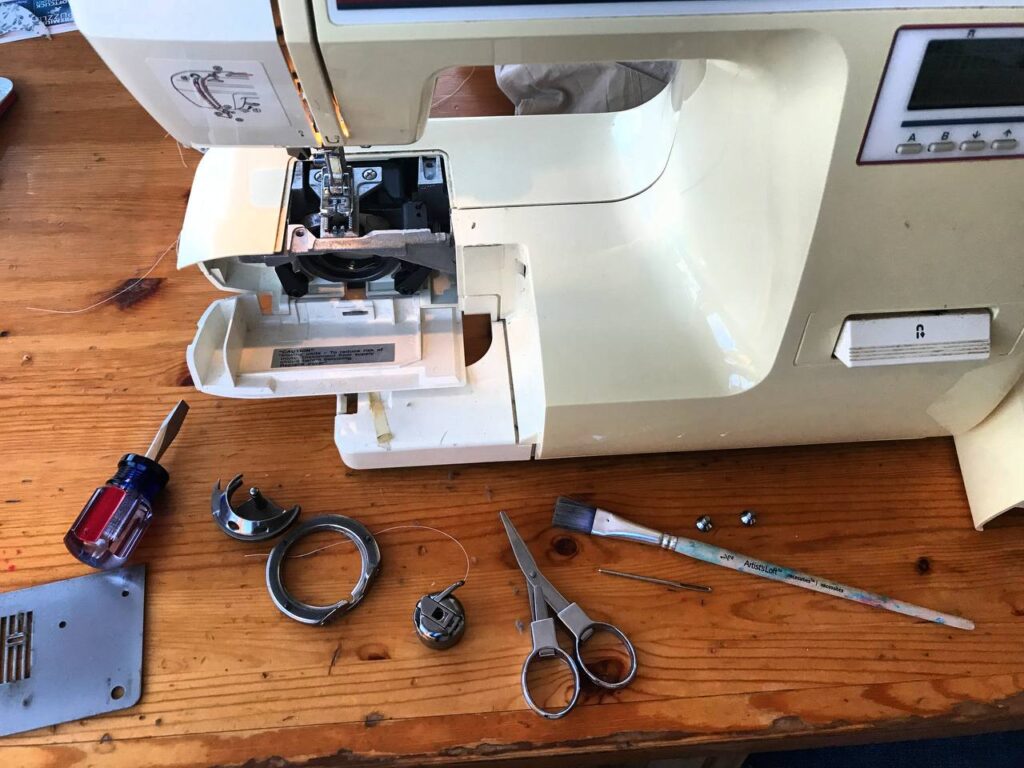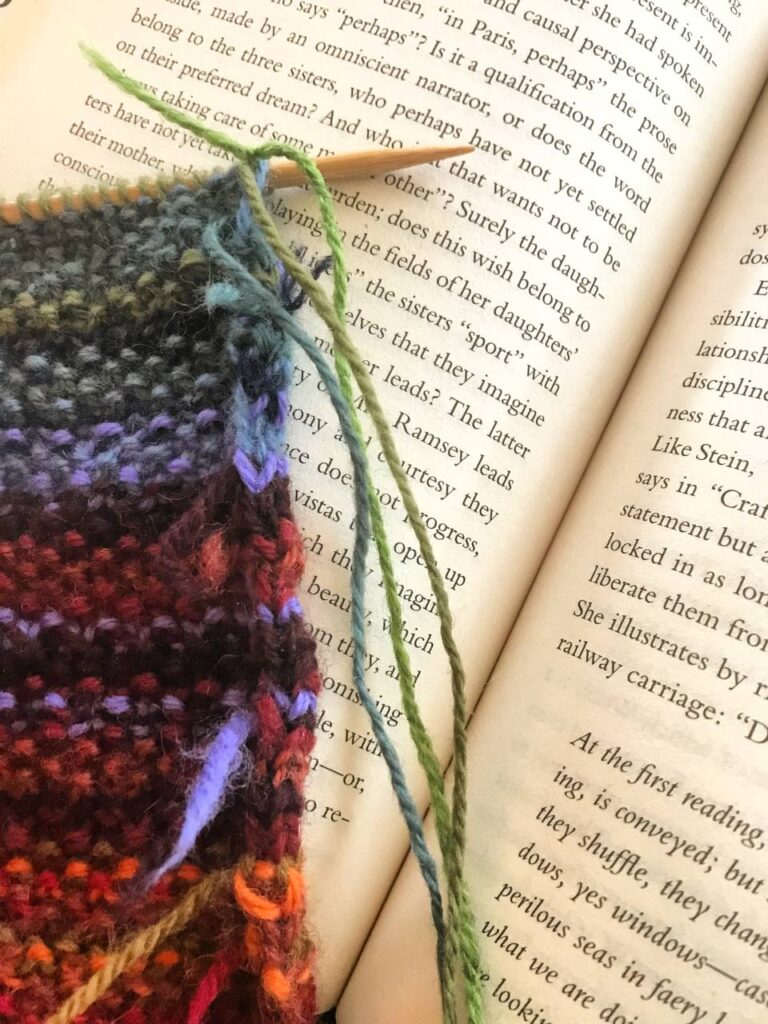I pulled the ancient sewing machine from its box and stared at it. We hadn’t spoken in years; I wondered if I still knew its language. There’s the cord, there’s the On switch, there’s the light and the pedal. Okay. I can do this.

I’d been thinking about pulling it out for a while but had conveniently hidden different sewing projects from myself so they’d stop nagging me. But that weekend, the duvet on our bed somehow (read: a cat is definitely responsible) acquired an L-shaped tear three inches across, right in the middle of the bed. Blargh. So there was no more putting it off; I had to reacquaint myself with the dreaded sewing machine.
You know why I like knitting and crochet? They’re simple. No buttons, no rethreading, no electricity; I control all the tension. No mysterious mechanisms hidden behind plastic panels that connive to take a simple length of thread and twist it into a conglomeration of mangled boy scout knots amid your fabric.
So, this machine and I…as you can see, we have a history of misunderstanding each other.
Also – and this is important, as you’ll see in a minute – this is a short-armed machine. As, I believe, most sewing machines from the 20th century are. You need to know this because the tear I had to repair was in the middle of a duvet the size of the Goodyear Blimp.
It went like this: Stuff three-quarters of the duvet through the tiny opening of the short arm of the machine. Hand crank the wheel, needle down, pedal for three stitches, push reverse button –
Wait. The reverse button doesn’t want to be pushed. Weird. Okay, push harder. Yep, there it goes, we are reversing, reversing, good, lift off the button – and now the &*%$ button doesn’t want to lift off; now it just wants to reverse. And the needle is stuck in the fabric.
By now the aforementioned snarl of thread has affixed itself to the underworkings of the machine, wrapping everything from the bobbin underneath to the Tesoro station down the street in miles of tangled thread.
But at least now I remember something of the language of sewing: One of its dialects is definitely laced with profanity.
Maybe this is why I’ve been learning that grace is perfected in weakness.
Several minutes later I have cut away the snarl of thread, freed the needle and duvet, and we are ready to make a quarter turn. So I lower the needle, lift the foot, stuff the remaining quarter of duvet through the tiny hole in the machine so as to replicate a small donut giving birth to a futon. Hand crank the wheel to ease the pedal into motion, remove pin, and take some comfort in stabbing said pin into the helpless tomato pincushion. This part of sewing, at least, is strategically therapeutic.
I hesitate to tell you all this because many of you are already fluent in Sewing Machine. Some of you are master quilters and seamstresses with years of expertise at this instrument, and you understand how this machine works so much better than I do. I just know the basics, and everything beyond that for me at this time is just grace.
(Yes, before any of you ask: I did oil the machine. Eventually.)

Anyway, I finished the project and got the duvet back on the bed, which was a good thing because in the stretch of a few days we went from a cold snap to a blizzard with seventy miles per hour wind. And this reminds me that heat and electricity, too, are grace – more of those mysterious things that provide abundance that I can’t control or contrive on my own, like perfect, even stitches.
We take hold of grace like we take hold of the time we have between power outages: We can’t control the power, but we do what we can do, like refill water bottles, flush the toilets, wash our hands. The power being on doesn’t do any of those things for me; it doesn’t shampoo Reagan’s hair or get the boys through their baths or finish the laundry. We have to do those things, but the reason we can do them is because the grace and power – er, electricity – is available to us.
And I don’t understand how grace works either; it’s mysterious mechanisms are a wonder to me. I also have buttons I don’t want pushed, and sometimes the tension is totally out of my control.
Right after the blizzard was Reagan’s birthday. I asked her a few days before how old she was, and she guessed and said sixteen, then I reminded her she was seventeen and asked how old she would be on her birthday (you can file this under “sneaky math”). And with that hint, she got it right and said eighteen.
Eighteen.
Eighteen.
I’m not quite ready for this, and I need grace here, too.
After she went to bed on her birthday I checked on her, asked her if she had a good day, and asked her again how old she was.
“Seventeen?”
“No, you were seventeen, but this is your birthday. So how old are you now?”
“Sixteen?”
But no, she is eighteen, which means nothing and yet everything all at once, and suddenly she’s an adult and she’s been our daughter for eleven and a half years. And I never in a million years thought that on this day we would still need to help her remember what her age is, or help her choose clean and appropriate clothes for the day, or that I would be assisting her with shampooing and scrubbing every time she’s in the shower. I don’t know what I thought. I guess I expected miraculous healing, and also that not as much would need healing.
I had a dream once, many years ago, that she was healed. She spoke perfectly, in full sentences, with perfect pronunciation in her husky voice. And that, too, was grace – a gift to see her the way God sees her, a vision that I could never have seen on my own.
Having an adult daughter live with us isn’t new; Iree lived with us until last summer. But this is different because this younger adult daughter needs help with hygiene, and language, and toileting, and we’ve suddenly moved from what just felt like parenting into caregiving. The line is blurry with special needs but the age makes it suddenly more pronounced. We have finally stepped over into that “someday” that we always talked about – “someday, when Reagan’s an adult, she will still live with us” – and suddenly today, and every day from now on, is that day.
There was always this thought in the back of my mind that she would be healed before we got here. But here we are.
She could still be healed. She has already been healed of so much. But still, we now have an adult daughter eating breakfast at the table who needs to ask to be excused lest she quietly wander off somewhere. And then I’ll remind her to wash her face and turn her shirt around, because I noticed she put it on backwards. I don’t mind those things. I just thought that by the time we reached this day, we wouldn’t still need to do them.
I stop here, lift my hands from the keyboard, and cover my eyes with them. And I remember that this is the language of special needs, heavily laced with words like Yes, and No, and expletives. There’s also grieving in tongues, and intercession, and so much grace perfected in weakness, I don’t understand any of it.
Likewise the Spirit helps us in our weakness. For we do not know what to pray for as we ought, but the Spirit himself intercedes for us with groanings too deep for words.
– Romans 8:26
I was talking to a friend recently about the steward who buried the talent because he was afraid of loss, afraid of his own inability, and afraid of his master’s wrath. He didn’t understand a lot of things, either, but because he chose fear and safety instead of wonder and risk, it crippled his growth and cost him severely.
When we misunderstand our Master’s values, we rely on ourselves and our own abilities, and get a reward that reflects it. But our Master loves grace, and obediently risky investment, and watching us try and learn and lean into the giftings and nudges He gives us. He loves it when we trust Him and need Him to pull us through.
And he who searches hearts knows what is the mind of the Spirit, because the Spirit intercedes for the saints according to the will of God. And we know that for those who love God all things work together for good, for those who are called according to his purpose.
– Romans 8:27-28
We do what we know, and when we know better, we do better. So we’re all in this uncomfortable process of learning better and then figuring out how to do better.
My first several years as Reagan’s mom were tumultuous as we both learned about the safety found in grace. But now she and I are learning to understand each other.

Crocheting and knitting were awkward when I first tried them, but now I have muscle memory, and things that used to be hard are easy. And that’s what’s happening as we grow and learn, when we are willing to walk in the wonder of trusting Him in all the things we don’t understand.
“Truly, truly, I say to you, whoever believes in me will also do the works that I do; and greater works than these will he do, because I am going to the Father.”
– John 14:12

If we think we have to understand everything before moving forward, or we refuse to try something new because we can’t risk imperfection or pain or failure, we will never achieve any “greater works” because we’ve chosen fear and safety instead of risk and wonder. And our reward (or consequence) will reflect it.
But there’s great power in our desperate need for grace. The realm of risk and wonder is where He’s called us to live: Where we are learning and trying and growing, gaining revelation, beginning to understand new things while living in the tension of so many mysteries.
It’s the only place where we see things the way He sees them, and not just as they seem to be. And it’s where we learn to not just understand His language, but to be fluent in it, because risk and wonder and grace are the language God speaks.
Want more posts like this, right to your inbox? Subscribe here.

Wow. Really makes me think and praise Him. Thank you.
Thank you, Charmain!